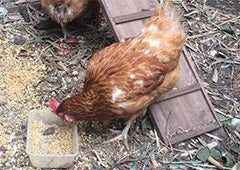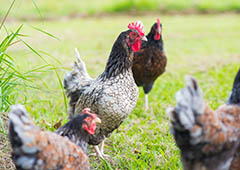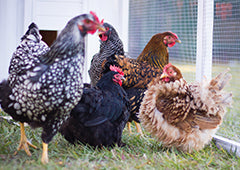
Keeping chickens can quickly become a very addictive hobby, and while you swore you were only going to have four feathered friends, often you start thinking about all the new breeds you would like to add to your flock one day.
Unfortunately, adding new chickens into your already existing backyard flock is not always as simple as putting them into the coop and letting them live happily ever after- problems are bound to occur.
It’s the nature of chickens to develop a ‘pecking order’, which is an established animal hierarchy within the flock. Every hen knows her place in the pecking order, so when new chickens are introduced, problems are likely to arise until the pecking order is re-established again. Read here for more on the chicken pecking order.
While some chickens will be tolerant of the newcomer, leaving her to be, others will give them not so warm a welcome- pecking and bullying them so they understand that their place is at the bottom of the pecking order. This can be very stressful for new chickens, especially those that are young.
If you’re wanting to add some exciting new breeds to your brood, without upsetting the pecking order, there are a few things to bear in mind to have a more harmonious welcome.

Work in Pairs or More
Being introduced into an already established flock can be very daunting for a solo chicky. So it is best to always try and introduce two or more chickens together at a time- even better if they are already well acquainted! This will keep the new chicken from being completely isolated by the rest of the flock, and if bullying is to occur, it won’t just fall on just one poor chicken.
Only Introduce Birds of a Similar Size and Age
Chickens can be real bullies, especially when they have smaller, weaker birds to pick on. So if you’re planning on adding new birds into your flock, try to get them similar in size and age, to help minimise bullying and fighting.
On the other hand, adding a large number of fit, young birds, can cause stress to a smaller number of more mature chickens.
If you have an existing flock but are also wanting to raise baby chickens, they should be kept in a separate coop or enclosure until they are old enough and strong enough to stand a fighting chance against the higher ranked chickens of the pecking order.
Add New Birds at Night
Your chickens should be settled and quietly roosting when the sun goes down, so this is the best time to introduce new flock members, giving them a little time to familiarise themselves with their new living arrangements before the chaos of the day begins. Just be sure be there at daybreak to attend to an chicken drama that may unfold!
Start out Slowly- Ease Them In
We have found that when adding to your flock, the best success comes from putting newcomers near your existing chickens, not actually with them. Do this by placing them in small fenced off area in the run if possible- this will allow the chickens to see another and get used to each others presence, but will keep them from being aggressive towards one another. This should feign the chicken’s curiosity, but not let them feel that their home is being invaded or their is a pending threat. Try and keep this arrangement for a week for the best chance at success.
Provide Distractions
By adding things such as bales of hay, or hanging a lettuce in the run, it will provide as a great distraction when introducing new flock members. Their attention will be more focused on scratching and pecking at the hay, rather than at the new girl on the block. This article has some great and super simple ideas for ample distractions.
Introduce in a New Location
If possible, place both your old and new hens in an entirely new and different location- be it a makeshift coop or fenced off area. This throws your older girls off balance, as it is not their home, and so they are more likely to be less defensive, and harsh towards the newcomers.
As difficult as it is to witness, you have to expect a certain amount of bullying- even in the best handled situations. New chickens means a new pecking order is to be established and so to keep their spot, fighting will unfortunately be involved.
Be sure to keep an eye on your new members, making sure that they aren’t being hurt too badly or are looking too stressed- if you are particularly worried about their wellbeing, remove them from the flock immediately.
After a week or so, things will start to sort themselves out, your chickens will accept the new additions, and peace will be restored within your flock once again.
If you're interested to learn more about how to keep happy and healthy chickens, our friends at Chickenpedia have some of the best online chicken keeping courses so I encourage all my readers to check it out.


















